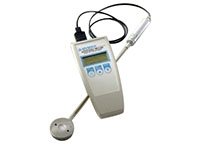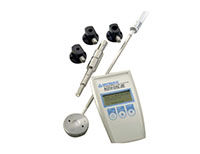| Items |
 39561 ACCU-CAL™ 50 Ultraviolet (UV) Intensity Meter Radiometer for Flood Lamps and Conveyors |
 39560 ACCU-CAL™ 50 Ultraviolet (UV) Intensity Meter Radiometer for Spot and Flood Lamps and Conveyors |
||
| Description |
Consistent UV light curing requires periodic monitoring of UV intensity or dose. The ACCU-CAL™ 50 radiometer is simple to operate and offers repeatable measurement of UV light. The ACCU-CAL™ 50 can measure UV light emitted from lightguides (3 mm, 5 mm, and 8 mm), UV flood systems, and UV conveyors. With a spectral sensitivity from 320 to 395 nm (UVA), the ACCU-CAL™ 50 measures intensities from 1 mW/cm2 to 40 W/cm2. A specially designed photo-sensor assembly protects the photo-sensor from the high temperatures sometimes associated with today’s high intensity UV spot lamps. Complete radiometer (without lightguide adapters or lightguide simulator (A lightguide simulator is used to measure direct spot lamp intensity (required to calculate lightguide transmission)); includes storage/carrying case. |
Consistent UV light curing requires periodic monitoring of UV intensity or dose. The ACCU-CAL™ 50 radiometer is simple to operate and offers repeatable measurement of UV light. The ACCU-CAL™ 50 can measure UV light emitted from lightguides (3 mm, 5 mm, and 8 mm), UV flood systems, and UV conveyors. With a spectral sensitivity from 320 to 395 nm (UVA), the ACCU-CAL™ 50 measures intensities from 1 mW/cm2 to 40 W/cm2. A specially designed photo-sensor assembly protects the photo-sensor from the high temperatures sometimes associated with today’s high intensity UV spot lamps. Complete radiometer with lightguide adapters (3 mm, 5 mm, and 8 mm) and lightguide simulator (A lightguide simulator is used to measure direct spot lamp intensity (required to calculate lightguide transmission); includes storage/carrying case. |
||
| Brands | ACCU-CAL™ Dymax® | |||
| Spectral Sensitivity | 320 to 395 nm | |||
| Intensity Range | 1 mW/cm² to 40 W/cm² | |||
| Intensity1 | 1 mW/cm² | |||
| Dose | 1 mJ/cm² | |||
| Calibration Period | 12 months | |||
| Optometer Operating Temperature Ranges | + 5 to + 40 ºC | |||
| Continuous Detector Operating Temperature Ranges | 120 ºC | |||
| Continuous Peak Operating Temperature Ranges | 200 ºC | |||
| Intensity Measurement Modes | mW/cm² W/cm² | |||
| Peak Intensity Measurement Modes | mW/cm² W/cm² | |||
| Dose Measurement Modes | J/cm² | |||
| Lightguide Size | 3 mm5 mm8 mm | |||
| Light Sources Application | Conveyors Floods | |||
| Number of Battery | 2 | |||
| Battery Type | AA | |||
| Battery Life2 | 250 h | |||
| Photo-Sensor Diameter | 9 mm | |||
| Diameter | 37 mm | |||
| Thickness | 8 mm | |||
| Cable Length | 1 m | |||
| Meter Length | 120 mm | |||
| Meter Width | 65 mm | |||
| Meter Thickness | 23 mm | |||
| Approval3 | CE Marked | |||
| Dymax® ACCU-CAL™ Radiometers | Dymax® offers ACCU-CAL™ radiometers for spots, floods, and conveyors. Kits for spot lamps include the complete radiometer with 3, 5, and 8 mm lightguide adapters and a lightguide simulator. Adapter kits are available separately for users who have an existing flood/conveyor kit and need to use it for spot systems. All radiometer kits include a storage/carrying case. ACCU-CAL™ radiometers are calibrated to measure either UV-A (320 to 390 nm), LED (~ 350 to 450 nm), or visible (395 nm to 465 nm) light intensity. | |||
| Radiometer Calibration | Dymax® recommends calibrating the ACCU-CAL™ 50 radiometer annually to ensure proper operation of the instrument. Calibration services are available through Dymax®. | |||
| Accessories |
Item # - 39554 Item Name - Flood to Spot Adapter Kit Description - Kit includes three lightguide adapters (3 mm, 5 mm, and 8 mm) and a lightguide simulator (A lightguide simulator is used to measure direct spot lamp intensity (required to calculate lightguide transmission)). Item # - 39556 Item Name - 3 mm Lightguide Adapter Description - Fits 3 mm ID lightguides (5 mm OD) Item # - 39557 Item Name - 5 mm Lightguide Adapter Description - Fits 5 mm ID lightguides (7 mm OD) Item # - 39558 Item Name - 8 mm Lightguide Adapter Description - Fits 8 mm ID lightguides (10 mm OD) Item # - 38408 Item Name - Lightguide Simulator (5 mm) Description - 5 mm lightguide simulator with a standard D connection |
|||
| Features |
|
|||
| Three Reasons to Use a Ultraviolet (UV)/Visible Radiometer |
|
|||
|
||||